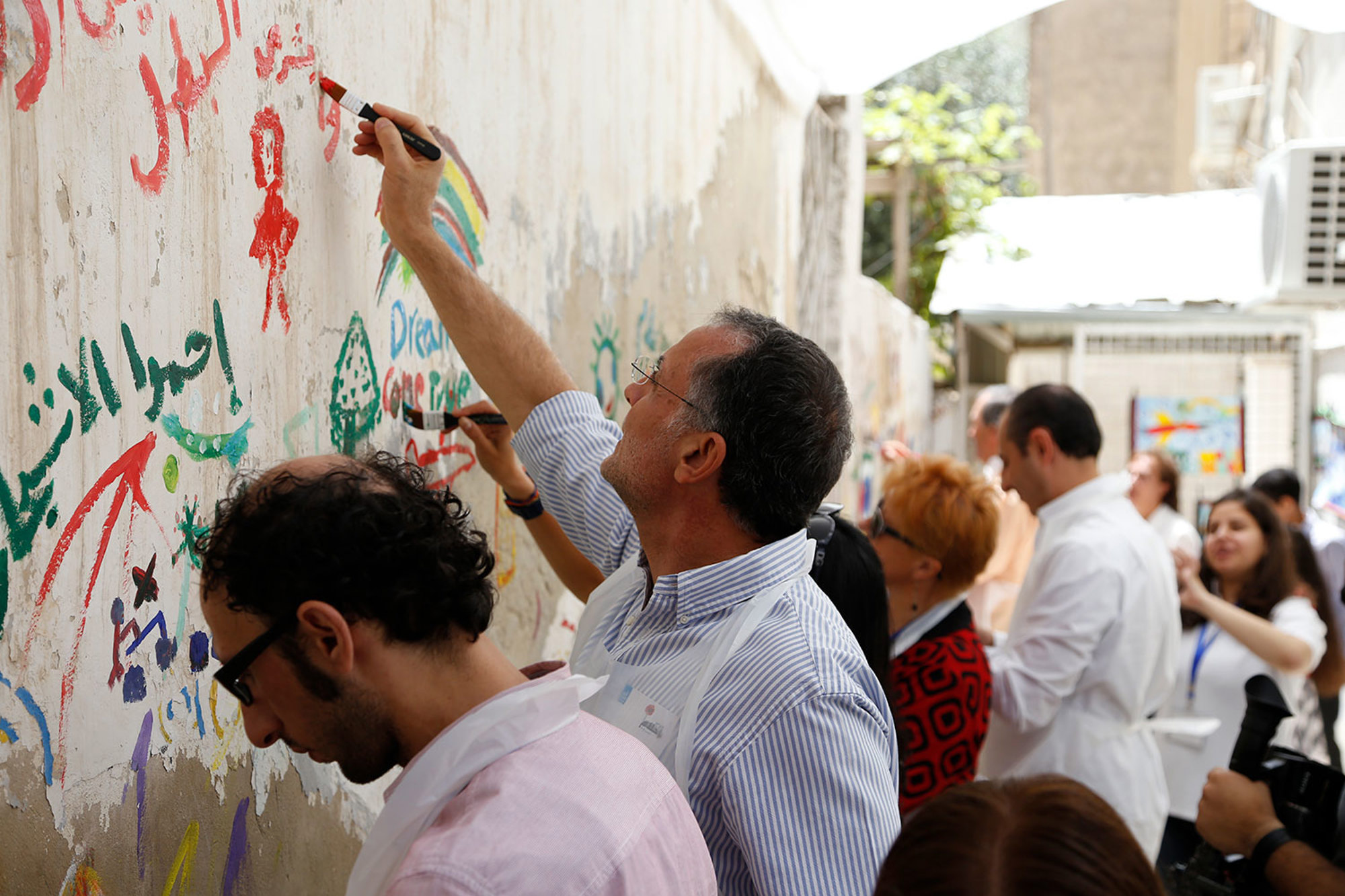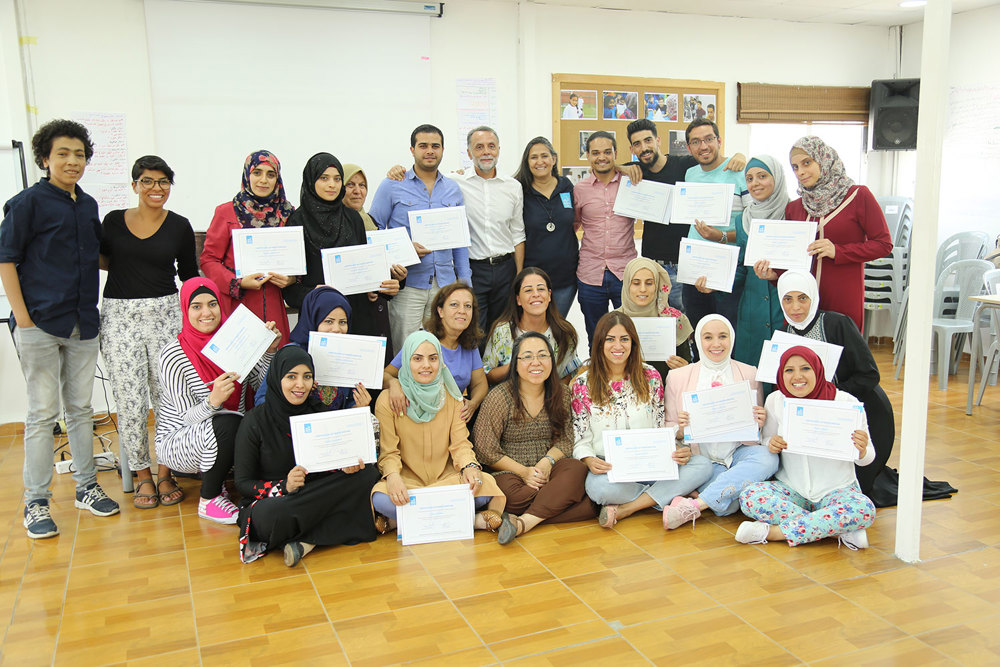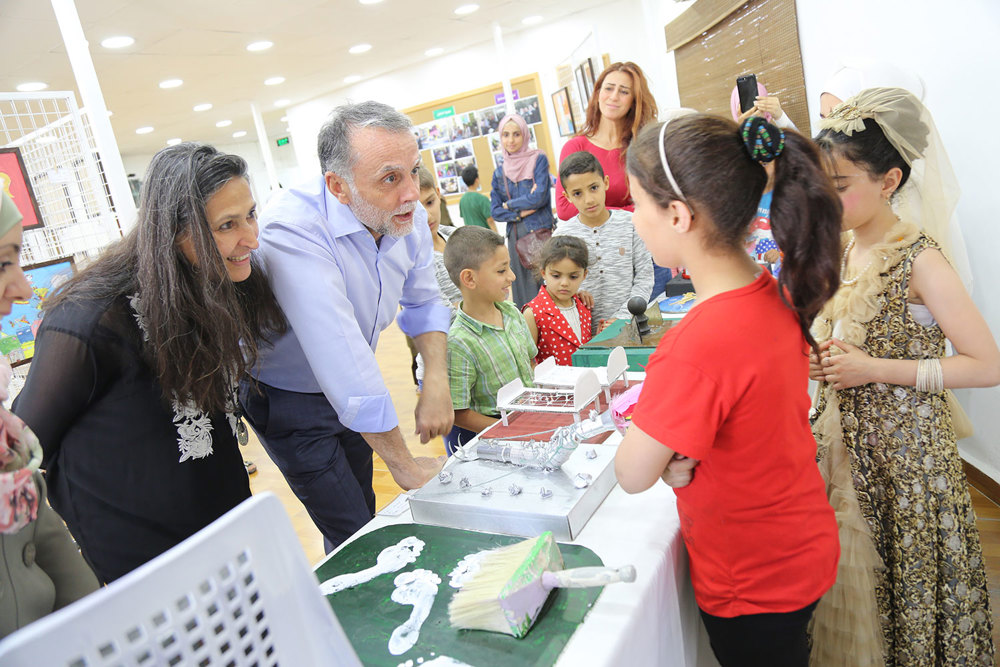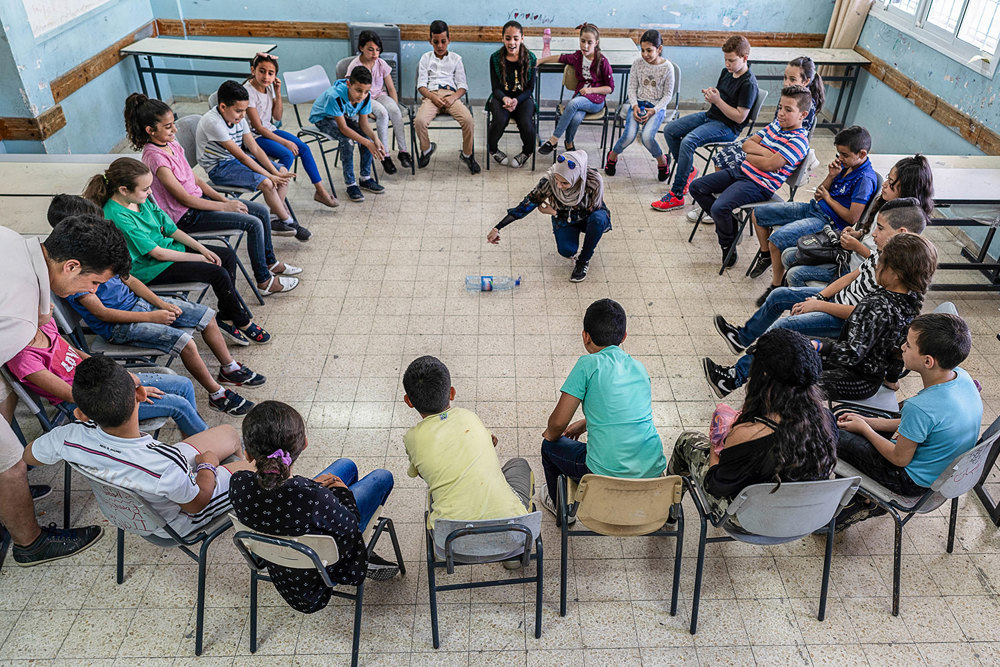Promoting youth-driven change
Ruwwad Al-Tanmeya provides a channel for the private sector to mobilize youth, empowering them to lead change efforts in their communities.

Ruwwad Al-Tanmeya provides a channel for the private sector to mobilize youth, empowering them to lead change efforts in their communities.

Young people have the potential to be powerful catalysts for change, if given the chance. Founded in 2006 by businessman and philanthropist Fadi Ghandour, Ruwwad Al-Tanmeya provides a channel for the private sector to mobilise youth, empowering them to lead change efforts in their communities.
It's geographic focus includes: Jabal Al Natheef, Al-Beidha (“Little Petra”), and Al-Tafileh in Jordan; Ezbet Khairallah in Cairo, Egypt; Jabal Muhsen and Bab El-Tebbaneh in Tripoli, Lebanon; and Qibya.
Listen. Invest in listening deeply and securing quick wins to gain the community’s trust.
Engage the community. Engage citizens to develop better solutions and foster agency.
Apply all assets. Demonstrate how to engage beyond funding, by investing time and expertise.
In 2005, Fadi Ghandour invested his own wealth, as well as funding from Aramex, to launch Ruwwad Al-Tanmeya (meaning "entrepreneurs for development"), a community-based organisation that would provide a way for the private sector to partner with government, civil society organizations, and marginalized communities.
He mobilised Jordanian businessmen to contribute to Ruwwad’s seed funding, including Khaled Al Masri — at the time chairman of Cairo Amman Bank and today chairman of Astra Group — who remains vice-chairman of Ruwwad Jordan’s board of directors. Through these collaborations, Ruwwad would work deeply in targeted areas, helping youth who live in economically and socially harsh conditions to access education, volunteer opportunities, cultural nourishment, business skills, and community organizing, in an effort to drive community development.
The goal: to support people in struggling communities, as the experts of their own locales, to reduce inequities and solve problems.
From the outset, Ruwwad broke from status quo approaches in three fundamental ways. First, it took bold steps to focus on and invest in young people, as Ghandour believed they had the energy and capacity to drive change in their communities. Ruwwad would provide scholarships and programs to help youth acquire the knowledge, skills, and networks "to actively pursue their dreams for a better future."
It would also enlist youth in community service work to help them "understand how they can mobilize their assets and resources to create the change that they want to see in the world," says Samar Dudin, Ruwwad’s regional director and head of programs.
Further, Ruwwad would create a "safe space" for youth — a forum in the community for them to ask questions, think critically, and develop self-awareness, as they look to their futures. Above all, Ghandour wanted to show the youth in these communities an alternative path and to deliver a positive message: "You are valued."
Second, Ruwwad focused on a citizen-led approach to community development. It chose to work deeply in a small number of disenfranchised communities, rather than more lightly across many, and refused to view residents as passive beneficiaries. Instead of implementing a traditional top-down approach, which can create a cycle of dependency, Ruwwad would listen actively to discern the community’s needs and help residents feel empowered to jointly design and implement solutions.
"The model is a sincere commitment to listening and being present and co-authoring," says Dudin, who volunteered at Ruwwad for five years before assuming her management role.
Finally, Ruwwad created a channel for private sector companies and individuals to engage in social development, allowing them to invest not only capital, but also time and know-how. It demonstrated this opportunity through Ghandour’s example, both individually and as CEO of Aramex.
"We believed that a company has a role in the society, and the job for business is not only business,” says Ghandour. "We wanted to influence and participate in the development process in the communities that we chose."
“People on the margins feel that they are forgotten. Youth especially feel they are not benefiting from social or economic gains that the rest of society has received.”
Fadi Ghandour, founder, Ruwwad

Ruwwad's programmes are created in consultation with the communities where they operate to ensure needs are being met. Photo: Ruwwad.
While Ghandour was formulating this concept for Ruwwad, he began looking for a place to put his vision into practice. As a board member of the Jordan River Foundation (JRF), in 2005, he visited the Jabal Al Natheef community in East Amman. Home to over 50,000 people, including an informal refugee settlement, Jabal Al Natheef struggled with poverty and woeful housing conditions, as well as crime, substance abuse, and youth unemployment 50 percent higher than the national average.
The stark contrast between Jabal Al Natheef’s entrenched poverty and the more affluent communities in West Amman left its residents feeling even more isolated and less valued. Having gained a ground-level view, Ghandour concluded that this was an ideal place to launch Ruwwad’s model.
The first step was to invest in building enough trust to develop a healthy partnership. Many of the community leaders were wary of outsiders, having rarely interacted with the private sector. Some feared Ruwwad might have a hidden agenda.
"For them, it was inconceivable that any institution from the private sector wanted to do more than simple charity," recalls Ghandour.
To help turn the community's concerns into confidence, Ghandour organized an initial meeting with community members and asked about Jabal Al Natheef's most critical needs. Under Ghandour's leadership, Ruwwad then followed through on several core issues they had raised. It lobbied for government support to build a police station, a long unmet need. It also rented a space for a health clinic, helped establish a post office, restored a dilapidated school, and established a children’s library.
"These were basic needs that we could fill," says Ghandour. "It is how we built trust because I showed that we wanted to work with them." With these fundamentals in place, Jabal Al Natheef's citizens could focus on tackling the community's deeper issues.
Fast forward more than a decade and Ruwwad has inspired and equipped East Amman residents in Jabal Al Natheef and neighboring areas to seize opportunities to come together, work through challenges in their community, identify solutions, and ultimately advance their neighborhoods' wellbeing.
Ghandour, Aramex and other funders — most notably Khaled Al Masri and Raghida Ghandour Rahim — helped fuel these efforts through their contributions to the "mother model" in East Amman and to expansions to other marginalized communities in Jordan (Al-Tafilah and Al-Beidha). Elsewhere, Aramex continues to be the regional supporter of Ruwwad in Egypt (Cairo) and Palestine (Ni’lin, Budrus, and Qibya).
Entrepreneur Hala Fadel led the establishment of Ruwwad Lebanon in Tripoli in partnership with Fadi Ghandour and continues to contribute, along with business people Sami Khouri, Noura Al Jundi, and Michel Helou, as well as Asma Zein, a leader of the professional women’s movement, and Amal Ghandour, Ruwwad's regional advisor for communications and strategy.
Across all locations, through its scholarship and community service and volunteer programs, Ruwwad has helped 2,127 young people realize their potential and become agents of change.
Additionally, as Ghandour puts it, Ruwwad has enabled thousands more people in disenfranchised communities by "shifting the community discourse from 'we need' to 'we want to do something about it', and actually working towards solving their own challenges."

Ruwwad’s early experience in Jordan shaped the core elements of its model. It has continued to build on these elements as it learns and responds to additional community needs. Its program offerings now span the categories of youth organizing, child development, and community support, with cross-sector partnerships being integral to each.
1. Youth organizing. Believing that "access to a good education is vital for achieving…a dignified life," Ghandour established the Mousab Khurma Youth Education and Empowerment Scholarship Fund (MKYEF), which he named for a close friend lost in a terror attack in 2005.
Ruwwad awards scholarships to young people aged 18 and older, to support them in completing degrees at quality universities and colleges. In exchange for the scholarship, youth spend a minimum of four hours per week throughout their scholarship term volunteering in other Ruwwad community programs. Ruwwad later connects youth scholars to internship and employment opportunities, provides them with career counseling in their chosen fields, and helps them expand their professional networks; supports that are not often available to students from disenfranchised areas. The organization also helps youth build self-esteem and real-world skills, such as thinking creatively and navigating social situations, so they can become active agents for change . Group discussions among the youth scholars and facilitators, called "Dardashat," promote free thought and encourage a diverse range of views.
"The questions at Dardashat start with 'who are we' and 'what sparks the way we see the world around us,' before moving to 'how do we navigate tensions to transform them into opportunities for problem solving and collective action,'" Dudin explains.
2. Child development. By working with youth, the team realized it could engage them even earlier in their lives. Helping children build strong character traits (such as resilience and compassion) and develop their creativity might better position them for long-term success.
Ruwwad partnered with the community to develop several programs for children aged eight to 13. Youth volunteers implement the programs, which include academic support, creative sessions in art and music, children’s literature, as well as sports and camps. Ruwwad uses inquiry-based learning as a framework for sessions on diversity, and recently introduced coding. It also works with both parents and schools in the community to create safe and conducive learning environments.
For boys and girls aged 14 to 17, Ruwwad provides workshops that focus on creating a safe environment for self-expression and reflection and are geared to developing problem-solving skills. It recruits these adolescents early as volunteers in the programs for younger children.
3. Community support. After launching the scholarship and youth program, Ruwwad began to hear from young people's families, with questions and requests on a much broader set of needs. Valuing the input of the community, the organization responded in two fundamental ways. First, the team set up its "Community Help Desk," where residents can seek support on anything from financial assistance and health issues, to job opportunities. Community volunteers work with residents to find solutions, often referring and connecting them to available resources, NGO programs, or services through the Ministries of Social Development, Labor, and Health.
When the help desk identifies common needs that span the entire community, Ruwwad responds by offering direct services, such as support for improving women's literacy and income generation.
Second, Ruwwad works to promote civic initiative and collective action among the citizens of Jabal Al Natheef by training and supporting them in launching campaigns for other necessary areas of change. Such campaigns have included:
A common denominator across all of Ruwwad's programs is Ghandour's dedication and heavy involvement. He interacts weekly with the regional director and head of programs, frequently engages and brainstorms with staff, and attends important events, such as career mentorship sessions. He also checks in regularly with youth scholars and other community members.
Ruwwad is a platform for partnerships: its programs come to life through critical partnerships between the private sector, NGOs, government, and the communities themselves.
Individuals from across the private sector dedicate time to support Ruwwad’s programs and operations, totaling a few thousand volunteer hours each year. Some lend their expertise to areas such as communications, IT, and finance. Others engage directly with youth, such as through the annual mentoring event for East Amman/Jabal Al Natheef's youth scholars, where they lead breakout discussion groups on various career paths.
Companies, including Aramex, also provide internship opportunities are an integral part of the business skills development program.
Ruwwad also partners with several local NGOs to deliver services. In Jabal Al Natheef, for example, the Justice Center for Legal Aid provides legal assistance to residents and helped organize the "For Your Sake" campaign. Another NGO, Bayt Silsal, enables youth with disabilities to access a safe space where they can express themselves artistically, with creations ranging from art accessories to installations.
Importantly, Ruwwad sees its work as adding to government efforts in disenfranchised communities, as opposed to replacing them. Ruwwad is a partner, not an alternative. "We wanted to work with the most vulnerable, where we can complement the work of government," says Ghandour.
Ruwwad collaborates with government agencies where possible, for example, working with the Ministry of Education on school renovations and vocational training, and the issue of child labor, and cooperating with the Ministry of Labor to identify employment opportunities for residents. As previously mentioned, Ruwwad also facilitates connections to government resources via its help desk.
With young people as the key implementers and other citizens serving as volunteers, Ruwwad operates with a lean staff of 34 full-time employees in its three centers in Jordan. More than 70 percent of the staff are from the community, including some who completed Ruwwad's youth scholarship program and adults who previously volunteered in community programs. Having experienced the power of Ruwwad’s model firsthand, they are now paying it forward by helping the next generation build a better future (see "A Journey at Ruwwad").
A handful of core funders, including Ghandour and Al Masri, Aramex, and other institutions such as Cairo Amman Bank and Ruyana Association led by Salma Kamal, support Ruwwad's activities; both Aramex and Cairo Amman Bank also sit on the Advisory Committee for the Scholarship Fund. Ghandour uses his private sector connections to identify additional funders who might fuel Ruwwad's mission.
Even as he works to enlist the private sector, Ghandour pushes to keep the organization free from politics. Ruwwad does not accept government funding or conditional aid money, which in Ghandour's view would deprive other NGOs that depend on it — and possibly discourage others in the private sector from supporting Ruwwad's work.
Catalyzing true change in disenfranchised communities is not easy, and Ruwwad has learned and evolved its approach along the way. In its early years in Jordan, Ruwwad tested many initiatives. Some proved to be too resource-intensive and did not tap sufficiently into citizens' full potential.
Recognizing this, Ruwwad began to focus more sharply on development, and trained its staff in helping local leaders develop their capabilities to overcome challenges. For example, the organization shifted away from running a nursery and focused on effective parenting, through community campaigns, to address early childhood needs.
As Ruwwad expanded to more communities, the team recognized the need to customize programming to fit local contexts. In Egypt, for example, Ruwwad learned it was more appropriate to award youth participants with two-year scholarships for vocational education in areas such as IT — rather than four-year, university scholarships — given the country's available employment opportunities.
The Ruwwad team also recognizes the need to deepen its investment in impact measurement, to provide a clearer line of sight into what works and what doesn't. While its measures to date have focused largely on reach, they are working to increasingly capture Ruwwad's intangible results, such as the extent to which the psychosocial supports enable young people to develop the patience, persistence, and other qualities that will help them succeed.
"You have to…keep asking questions, learning from success and failure, and reflecting," says Dudin.
In each of its current locations, Ruwwad plans to build on its model for civic engagement and grow its offerings — directly or indirectly through partnerships — as new community needs emerge. "We have become a platform, where there are opportunities for all people [interested in providing a service] to plug in," says Ghandour.
Ghandour also believes Ruwwad's model, with its focus on private sector engagement, citizen-led change, and youth empowerment, can lead to sustainable development in many more countries. To encourage leaders to replicate the approach, the team shares much of its information and experiences, even as it remains focused on the Arab region.
"We are passionate about our immediate geography, and this is where we feel we can have the most impact," adds Ghandour.

Ruwwad offers a model for civic engagement across the region's disenfranchised communities.
Invest in listening deeply and securing quick wins to gain the community’s trust
From the beginning, Ghandour focused on earning the trust of community members who did not know him or his organization and who were unaccustomed to offers of help from the private sector. The first step was to avoid coming into Jabal Al Natheef with a preset agenda. Rather than immediately provide answers, the team listened deeply to understand the community's most pressing needs, and valued and respected its input.
Recognizing that trust is won through deeds rather than words, Ruwwad’s team then moved quickly to deliver on basic requests for improving the community’s infrastructure. Some of the work fell outside of Ruwwad’s scope — such as successfully advocating for a long-awaited police station and a much-needed health clinic. However, these successful efforts helped win the community’s trust, which not only gave Ruwwad the space to build its core programs, but also the credibility to enlist citizens in generating change.
Engage citizens to develop better solutions and foster agency
Ruwwad's team understands that community members are the real experts when it comes to working out solutions, as they are the closest to their neighborhoods' problems. The team works with residents to design programs that address gaps that can deter social and economic progress.
From listening to young people, Ruwwad learned that scholarships and career coaching, while essential, were not sufficient by themselves. Programs such as the Dardashat interactive discussions and the relational dynamics, emotional intelligence, and life coaching sessions grew out of a recognition that young people, by engaging in self-knowledge, group dialogue and listening to diverse perspectives, could make far greater strides in their personal development.
More critically, Ruwwad equips citizens with the tools and supports to implement these programs themselves. For example, it teaches youth volunteers that mentoring matters and gives them the skills to guide younger children. It supports local women in leading community campaigns. Engaging community members not only ensures the work is relevant and sustainable, but also instills a sense of ownership — a requisite for long-term change.
Demonstrate how to engage beyond funding, by investing time and expertise
Ghandour is a core funder, and he is also heavily involved in Ruwwad's programs and operations. His personal investment animates the Ruwwad team and advances their knowledge. Importantly, it also serves as an example for other private sector actors.
Ghandour poses this question to his peers: "Corporates have a role and responsibility towards society. We're entrepreneurs, we all have capabilities, we all have networks. And as employers, we’re very aware of the issues. Can we step up and do something for marginalized communities?"
Under his example, Ruwwad has provided pathways for others in the private sector to support community development, whether by mentoring young people, volunteering in community programs, or supporting Ruwwad’s operations.
This content was first published in 2020 by Project Inspired, a collection of video interviews and case studies drawn from conversations with some of the Arab region’s leading philanthropists and foundations. Project Inspired is supported by the Abdulla Al Ghurair Foundation for Education and the Bill & Melinda Gates Foundation, and produced by knowledge partners The Bridgespan Group and Philanthropy Age.
Download a PDF version of this case study here.
It's a good idea to use a strong password that you're not using elsewhere.
Remember password? Login here
Our content is free but you need to subscribe to unlock full access to our site.
Already subscribed? Login here